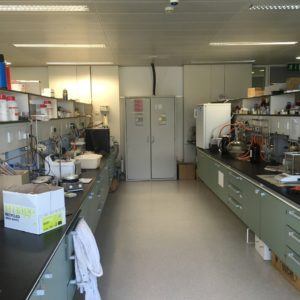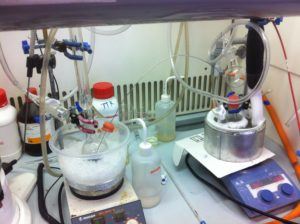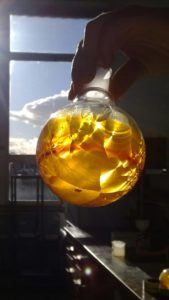Profile
Roisin Jones
Splitting my time between working from home and working in the lab, and making increasingly elaborate meal plans!
My CV
-
Education:
Rathduff NS (1994-2002), Scoil Mhuire gan Smal Blarney (2002-2008), University College Cork (2008-2020)
-
Qualifications:
BSc Chemistry with Forensic Science (Hons), PhD in Chemistry
-
Work History:
O’Flaherty’s Quik Pick (2003-2006), Costcutter Grenagh (2006-2010), Coca Cola (Jun-Aug 2008), GSK (2017-2019)
-
Current Job:
Technical Development Chemist at Thermo Fisher Scientific
-
About Me
I'm an Irish chemistry researcher, currently working for a pharmaceutical company called Thermo Fisher Scientific.
-
Read more
I live in the south of Ireland, with my best friend and our two cats, Pip and Floof. My favourite foods are pretty much all kinds of Indian food, and also lemon cheesecake, chocolate and Ben & Jerry’s ice cream. Outside of my job, I love photography, cooking, singing (I sing in a local choir) and sport (I play tag rugby), along with reading and watching TV when I have a chance, which is more than usual at the moment as choir and tag rugby are of course cancelled! We’re currently watching some classic scifi with Stargate SG-1 and also been catching up on Taskmaster on YouTube!
-
Read more
Every day scientists think up of new drugs that might be helpful in treating a disease: to test this, they put them through a series of tests called ‘clinical trials’, which starts out with preclinical tests in test tubes/animals, and works its way up to Phase 3 (large scale testing in humans). To run these trials, they need a way of making their drugs, and that’s where my job comes in: we develop ways of getting from common chemicals (known as precursors or starting materials) to the specific compound they want to test. For example, a project I worked on recently was all about making a compound for Phase 3 clinical trials: we had to make a lot of it on very short notice and we had to run a lot of experiments in the lab to figure out the best way of doing it and solve the problems we ran into along the way.
My job also involves figuring out new ways of making drugs that have already been developed. Drug companies do this for a number of reasons: to make a drug cheaper, to reduce the time it takes to make it, or to make the process safer. For example, I recently worked on a project that was all about figuring out a new way to make a HIV drug so that the cost of the drug could be reduced: it’s very rewarding to work on projects like that, because you know that the impact it will have will be very important to a lot of vulnerable people.
Before I started working for a pharmaceutical company, I did my PhD in Impurity Profiling, which basically means seeing if you can track how criminals are making illegal drugs by looking at the by-products that are formed while making them. I used to make the by-products (or impurities) that are formed when you make illegal drugs and see if I could detect them in reactions: this told me more about how criminals make illegal drugs and this kind of information can be used by the police and the government to figure out what shipments might be suspicious, and what chemicals they should restrict access to.
-
My Typical Day
My day tends to be split between researching online, running reactions in the lab, and taking the data from those reactions and trying to analyse it. I also spend a lot of time working with my colleagues and sharing information, which is a big part of how science works!
-
Read more
I’ll be honest, my day starts with a LOT of coffee: I am not great at getting up in the mornings! Then I drive to work (although I’m staying at home when I can at the moment, my housemate insists that I can’t bring my chemistry home!) and once I start work, I tend to spend my time in the lab, putting on my reactions, taking them off and analysing them, and finally sitting in front of my computer looking at the data I get back and/or researching what reactions I should put on next. I also spend time investigating how to improve existing processes: for example, it takes us 48 hours to finish this reaction that has to be run at 0°C, but if I ran it at 5°C or 10°C, would that speed it up? How much energy would it save? Would it still be safe? Would it change the quality of the material we get out? 5-10°C change might seem very trivial, but it could be the difference between getting good material we can put into medicine, or bad material that we would have to get rid of.
I also spend time in meetings during the day, discussing my results and plans with other scientists. This is a really important part of my work, as talking through my plans with other people often needs to new ideas or a way to solve a problem that I hadn’t thought of!
Lunch is anywhere between 12 and 1 for me, and then I go back to doing more labwork and meetings until I finish up at 4.45pm. Before I leave, I make sure everything in the lab is properly shut down to make sure nothing will flood or overheat overnight, and then I head back to home to have my dinner, go for a walk and watch a little bit of TV or read a book.
-
My Interview
-
How would you describe yourself in 3 words?
Happy, Enthusiastic, Nerdy
What did you want to be after you left school?
A research scientist! So that’s going pretty well.
Were you ever in trouble at school?
Nope.
Who is your favourite singer or band?
Love me some Hozier, and also Janelle Monae.
What's your favourite food?
Butter Chicken (though all Indian food really).
What is the most fun thing you've done?
Visited Pompeii and climbed Vesuvius.
If you had 3 wishes for yourself what would they be? - be honest!
1) Have a really nice camera (my phone one just doesn’t cut it sometimes!). 2) Visit and tour New Zealand, though that one's going to have to go on the backburner for now (not gonna lie, this has been on my list since I saw Lord of the Rings aged 12). 3) Have the money to solve problems for my family and friends.
Tell us a joke.
Johnny was a chemist’s son, but Johnny is no more, what Johnny thought was H2O was H2SO4!
-
-
Work photos:
This is the lab I worked in during my PhD, complete with glassware presses, hotplates, chemicals and pretty much anything else we needed to get on with our work. These days I work in an industrial lab, but the set up remains basically the same – we do have some fancier kit at work though.
This is one of the more complicated reaction set-ups I’ve ever dealt with, involving two separate reactions at different temperatures (one at 0°C and one at -78°C), connected by a canula that fed one reaction mixture into the other.
This is quite an old photo of mine, but it remains one of my favourite images of chemistry, a reminder that we can make some truly beautiful things with science.



